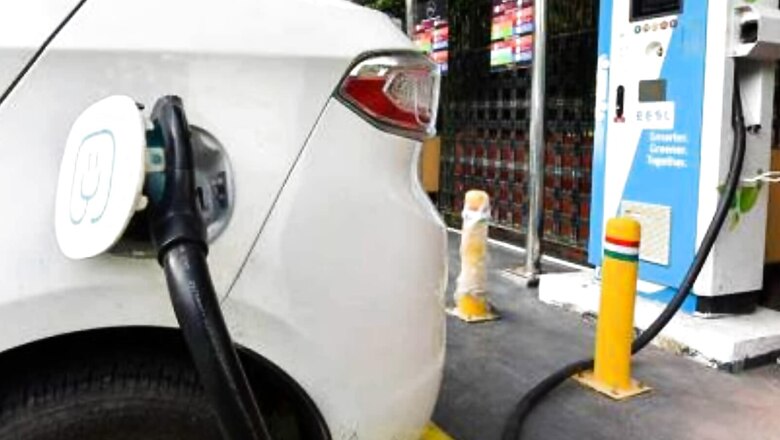
views
With increasing oil prices, climate change and sustainable living related discussions becoming topics of public discourse, electric mobility is also becoming more than a buzzword. A slew of electric 2-wheeler and 4-wheeler launches in India in the past few years and even more launch announcements at Auto Expo 2023 has brought this category in the news once again.
The automobile sector has been through numerous ups and downs in recent years. However, according to a recent Kantar survey, for consumers to move away from traditional Internal Combustion Engines (ICE) vehicles to EVs, they will require incentivisation and infrastructural support.
This is another area where the budget allocation is expected to increase.
With the focus of the government towards sustainable mobility, Gajendra Jangid, Co- Founder, CARS24 is also expecting a reduction in GST for electric vehicles, as well as support in building the capacity to produce and manufacture EVs for the masses as we drive towards a better India.
Many conventional automotive players and oil companies are investing heavily to boost EV demand and adoption. Hence, other stakeholders are also expecting new initiatives in order to boost the sector and further accelerate the momentum.
Greg Moran, Co-Founder and CEO, Zoomcar, said, “In this year’s Budget, the government must renew its focus on enhancing infrastructure to make the production and usage of EVs and EV-related features, like charging stations, easier. The best alternative and most plausible solution for those seeking eco-friendly and sustainable commute options, apart from EVs, would be to rent cars.”
Also Read: Budget 2023 Expectations: Foreign Currency Investment, Carbon Credits; What Energy Sector Hopes For
Moran added that the government must encourage people to make sustainable choices when it comes to commuting. Renting an EV would be ideal for a majority of the population that wishes to own a car without the commitment and additional costs. “We are hoping for the car rental sector to grow further and this progress is significantly reliant on the budget.”
India’s electric mobility journey is gaining momentum. By 2030, the country is forecasted to be home to 102 million EVs, with 2.9 million public charging stations needed to accommodate the growing EV adoption, a KPMG analysis said.
Sakshi Vij, Founder and MD, Myles Cars, feels that the EV adoption is at an inflection point in India.
“While the commercial/logistics sector has seen a good adoption, the individual vehicle owner is still on the fence. If the budget addresses issues such as high initial cost of ownership through incentivising individual vehicle owners the EV adoption will see a boost. Ease of registration, electric bill incentives as well and carbon footprint saving incentives could be a step in the right direction for individual travelers as well,” Vij suggested.
Some experts feel that India is undergoing a transition, and its automobile sector is no exception and the demand for climate justice for future generations has gained momentum.
Nimish Trivedi, Co-founder, Prakriti E-mobility, “We expect the government to introduce policies/schemes that further support EV car manufacturers and cab service providers. In addition to this, we hope that the government will provide incentives and relaxations in establishing a network of EV charging hubs across India, a move that will help the union government to achieve its carbon emission target in a given timeline.”
Akshay Singhal, Founder and CEO, Log9 Materials feels that the government should include EVs in Priority Sector Lending (PSL) in order to make financing EVs cheaper and making them more affordable for the masses.
“When it comes to incentives and financial enablers, the government must take into consideration not just the volumes of production committed by manufacturers, but also the technological superiority of the vehicles and battery technologies in terms of safety, longevity, and fast-charging so as to ensure only the best reaches the final customers,” Singhal added.
Also Read: Budget 2023: Is Govt Planning To Overhaul Income Tax Regime? Check Latest Update
Even when the EV sales have doubled in the last year, the industry still suffers from higher initial ownership costs of EVs, which is a direct result of higher input costs, stated Rahul Jain, Director of Crayon Motors.
“We hope the upcoming budget will reduce GST on raw materials/components, thereby accelerating India’s EV race. Because battery manufacturing in India relies heavily on imports, some duty relief could help reduce overall costs. EVs have fewer financing options and higher interest rates than ICE vehicles. The EV industry is hoping for a positive outcome from the government’s meeting with the World Bank. Aside from the PLI expansion, other state government programs such as GEDA and central government initiatives such as ‘Atmanirbhar Bharat’ would undoubtedly benefit,” Jain said.
Etrio Automobiles believes that the Budget should focus on introducing more schemes and policies to support innovation and capacity-building, and to reward EV adoption.
“It is imperative that as a nation India must make its manufacturing capacities stronger and fortify its localised supply chains,” Kalyan C Korimerla, MD and Co-Promoter, Etrio said.
Korimerla also added that to ensure that commercial or cargo EV adoption does not remain limited to the larger industry players, the Budget must incentivise small businesses and MSMEs to join the ICE to EV transition bandwagon as well.
Moreover, the government is taking a number of steps to promote use of electric vehicles in India. India had more than 13 lakh EVs as of July 2022.
EV penetration in India is still in its nascent stage. As per the KPMG analysis, a critical facilitator of EV adoption is the availability of charging infrastructure.
This increasing number of public charging stations is expected to be driven by a range of players, such as pure-play charge point operators, oil marketing companies, utilities and EV fleet operators, the analysis said.
In order to promote manufacturing and usage of electric and battery eco-friendly vehicles in the country, in 2015 the government launched the Faster Adoption and Manufacturing of (Hybrid) and Electric Vehicles in India (FAME India) Scheme with an aim to reduce dependency on fossil fuel and to address issues of vehicular emissions.
At present, Phase-II of FAME India Scheme is being implemented for a period of five years from April 01, 2019 with a total budgetary support of Rs. 10,000 crores. This phase focuses on supporting electrification of public and shared transportation.
Read all the Latest Business News here
















Comments
0 comment